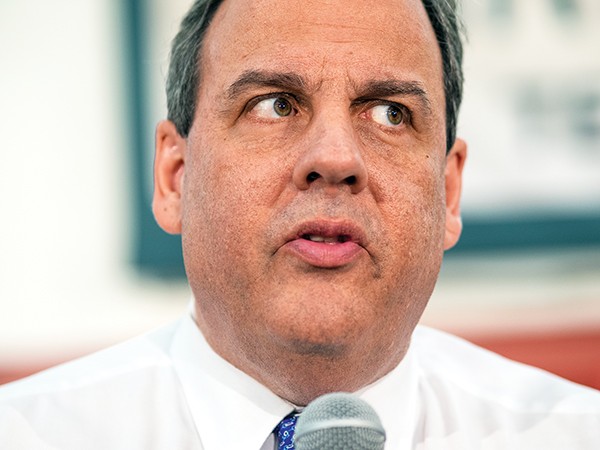President Trump, with his low approval ratings, chaotic White House, and health-care failure, might as well be on the ballot in three elections before the end of the year.
In Alabama, Republicans running to fill the Senate seat vacated by Attorney General Jeff Sessions are staging a red-state referendum on Trump, who won the state by almost 30 points last November. But the president is dividing his Alabama supporters with steady attacks on one of the state’s favorite sons: Sessions.
Trump is also at the center of two gubernatorial races — in Virginia and New Jersey. Trump lost both states in the presidential election. Democrats now delight in stirring up their base by putting Trump’s face on every Republican opponent.
 John Poltrack | Dreamstime
John Poltrack | Dreamstime
Chris Christie
The question in Alabama, however, is which candidate for the GOP nomination is the most pro-Trump.
Luther Strange, the Republican appointed to hold the seat until the December general election, is running as a GOP primary candidate who “strongly supported our president from Day 1.”
He is attacking one opponent, Mo Brooks, for saying during the presidential campaign that Trump voters would come to “regret” backing the billionaire. Brooks supported Senator Ted Cruz and blasted Trump as a “serial adulterer.”
A poll made public last week found Strange leading the race with 33 percent of the vote; another pro-Trump candidate, former judge Roy Moore, with 26 percent; and Brooks in last place with 16 percent.
Brooks has offered to drop out of the race if Sessions wants to resign his post and run for his old seat again. The primary will be held August 15th, with a possible run-off in September.
In the Virginia and New Jersey gubernatorial races, the polarizing dynamic around Trump is different: Democrats are stigmatizing their GOP opponents as Trump acolytes.
Virginia’s Lieutenant Governor Ralph Northam, the Democrats’ nominee, is running an advertisement calling Trump a “narcissistic maniac.”
“I stand by what I said,” Northam said at a debate held earlier this month. “I believe our president is a dangerous man. I think he lacks empathy. And he also has difficulty telling the truth, and it happens again and again.”
The Republican candidate, former RNC chairman Ed Gillespie, who is roughly tied with Northam at 44 percent support in the polls, countered that the Democrat’s attack would make it more difficult to work with Trump on behalf of Virginia.
Gillespie has already been torched by Trump politics. Despite a big money advantage, he came within 1.2 percentage points of losing the GOP primary to Corey Stewart, a diehard Trump supporter who accused Gillespie of not being loyal to the president. Now Gillespie needs to make sure Stewart’s Trump-loving voters turn out for him in November. But he also has to appeal to moderates and independents in a state Hillary Clinton won by five points.
Trump is also a major factor in New Jersey’s gubernatorial race, where Clinton won by 14 points. The difficulties Republicans face there are ratcheted up due to incumbent Governor Chris Christie’s rapid fall in the polls. Christie was also a strong, public voice for Trump.
Those factors are hurting GOP nominee Kim Guadagno.
A July Monmouth University poll found Democrat Phil Murphy leading Guadagno, 53 percent to 26 percent, with 14 percent undecided. Guadagno has tried to distance herself from Trump. After the infamous tape where he was heard bragging about being able to grab women by their genitals, Guadagno declared she would not vote for Trump.
“No apology can excuse away Mr. Trump’s reprehensible comments degrading women,” Guadagno wrote on Twitter. “We’re raising my 3 boys to be better than that.”
Democrat Murphy has turned his campaign into part of the “Resist” Trump movement. He promises that when he is governor, New Jersey will be “a state where we draw a line against Donald Trump.” Murphy, President Obama’s ambassador to Germany, has suggested there are parallels between Trump’s rise and the rise of Adolf Hitler in 1920s Germany.
“I’m a modest student of German history,” Murphy told voters at a town hall earlier this year. “And I know what was being said about somebody else in the 1920s. And you could unfortunately drop in names from today into those observations from the 1920s.”
Elections in odd-numbered years are often a harbinger of the following years’ midterm elections. When Republicans Christie and Bob McDonnell won the New Jersey and Virginia gubernatorial races in 2009, it foreshadowed the Tea Party-wave election of 2010. When Democrats Jon Corzine and Tim Kaine won those races in 2005, it foreshadowed the Democrats’ takeover of Congress in 2006.
Currently, Democrats hold a 48-39 percent lead over Republicans in the Real Clear Politics polling average when voters are presented with a generic choice for congressional elections.
As Virginia and New Jersey go, so goes the nation?
Juan Williams is a FOX News political analyst. He writes for The Hill, where a version of this column first appeared.